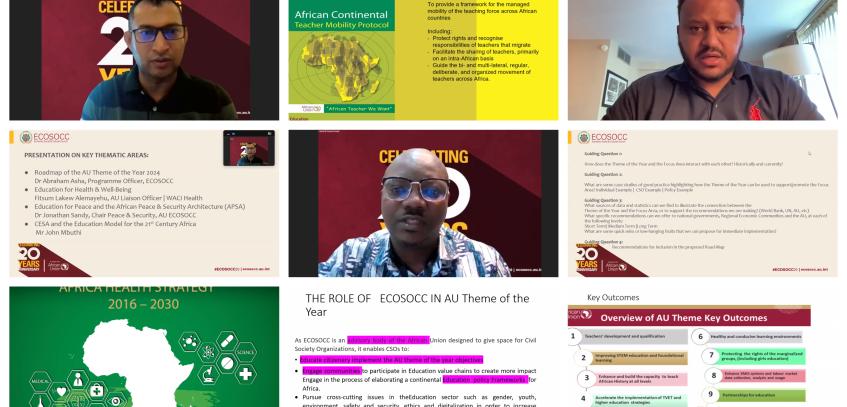ECOSOCC’s ongoing Consultations on the Theme of the Year for 2024, focusing on education, proceeded with its second session on 16th April 2024, revealing both significant challenges and effective strategies for educational reform across the continent.
Dr. Abraham Asha, Program Officer at ECOSOCC, kicked off the session with a presentation on the AU Year of Education Roadmap. He provided examples of critical issues that the AU seeks to address this year, including Africa’s stark shortage of 17 million teachers.
Diverse Contributions and Advanced Frameworks
The session, moderated by Dr. Raj Chintaram, Program Officer & Focal Point for ECOSOCC National Chapters, outlined the upcoming phases of the consultations. Participants, including Civil Society Organizations (CSOs), are set to be divided into four thematic groups to deepen discussions and refine contributions towards the development of a comprehensive roadmap and policy document for the AU’s 2024 education theme.
Mr. Fitsum Lakew Alemayehu, AU Liaison Officer at WACI Health, underscored the crucial role of CSOs in advancing the Africa Health Strategy and other AU health frameworks, emphasizing how these efforts are intrinsically linked to educational initiatives.
Cultivating Change Agents
Through Education Education Research Consultant, Mr. John Mbuthi, delivered an insightful overview of the African Union Continental Education Strategy (CESA 16-25), which is designed to forge a new generation of African citizens who are effective change agents for sustainable development. This framework places the learner at the center of education, aiming to align education systems with African core values and prepare students to actualize the AU's vision.
Focus on Inclusivity and Technology Integration
The importance of revising curricula to make education more accessible, relevant, and skill-oriented was a key topic.
Mr. Mbuthi advocated for integrating technology into learning processes to better prepare African youth for real-life challenges and ensure their ability to compete as global citizens.
Inclusivity was also a major theme, with an emphasis on the need for education policies that cater to the needs of all children, particularly those with physical challenges. It is essential for educational assessments to focus on skill development, ensuring that every learner’s potential is fully realized.
Looking Forward
As the consultations move forward, stakeholders are encouraged to participate actively in their designated groups. With the next session scheduled for April 23, participants are reminded to check their emails for links to select their groups and contribute effectively to the deliberations ahead.


